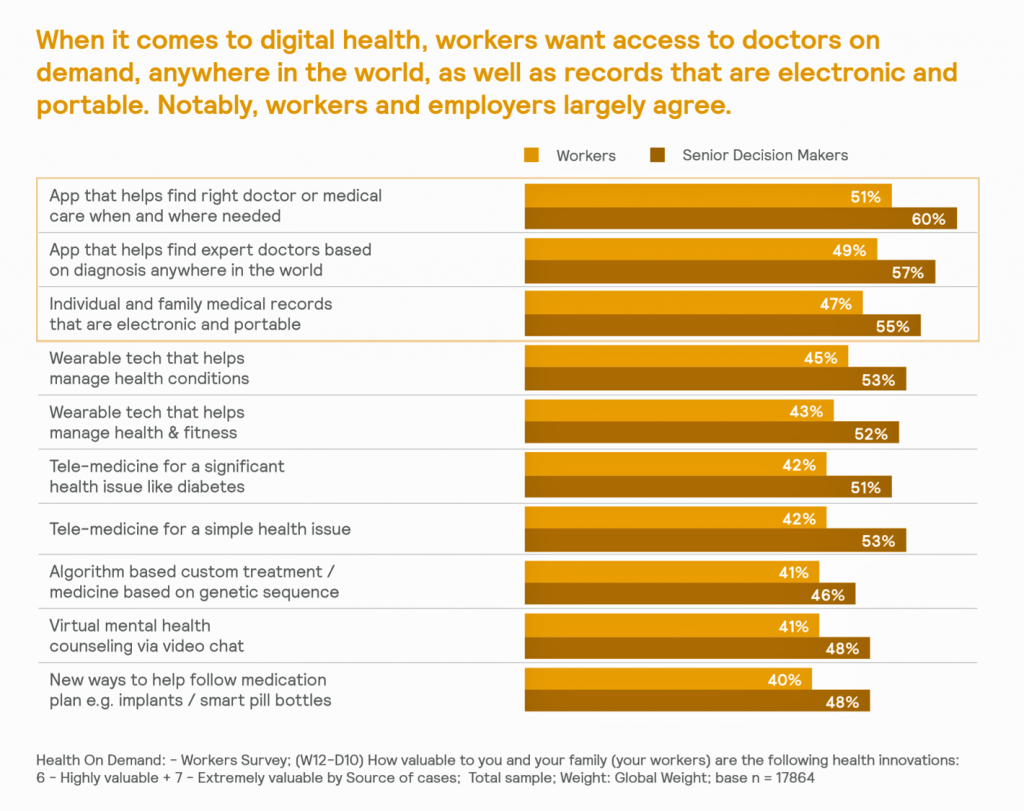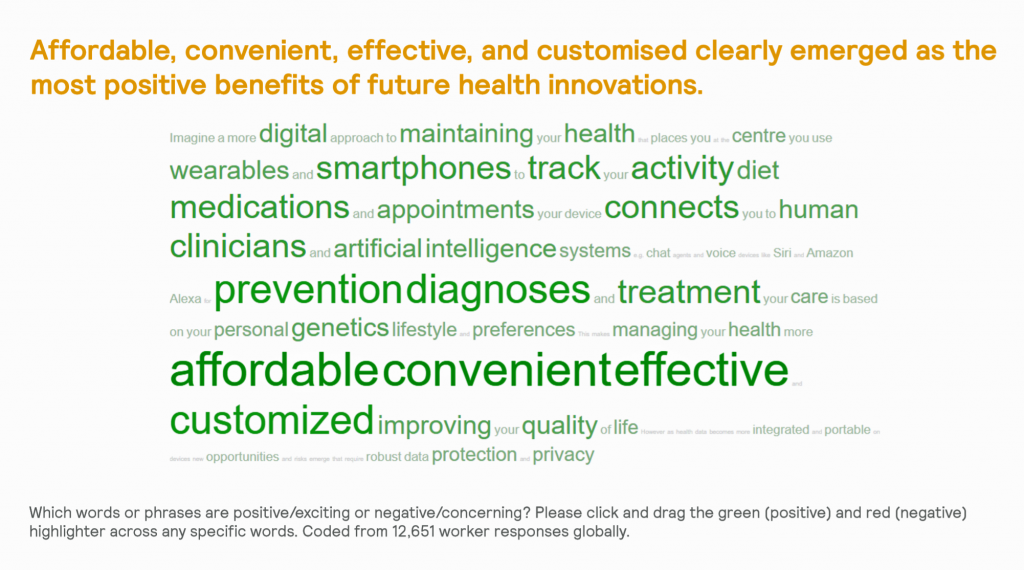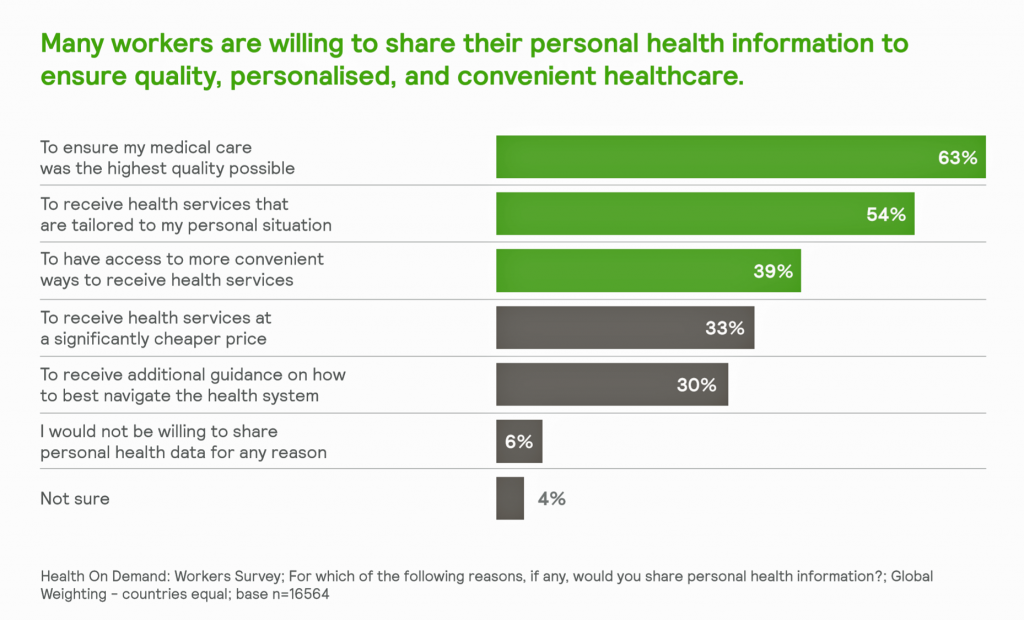Most employers and their workers see the benefits of digital health in helping make health care more accessible and lower-cost, according to survey research published in Health on Demand from Mercer Marsh Benefits.
Interestingly, more workers living in developing countries are keener on going digital for health than people working in wealthier nations.
 Mercer’s study was global, analyzing companies and their employees in both mature and growth economies around the world. In total, Mercer interviewed 16,564 workers and 1,300 senior decision makers in companies. The U.S. sample size was 2,051 employees and 100 decision makers.
Mercer’s study was global, analyzing companies and their employees in both mature and growth economies around the world. In total, Mercer interviewed 16,564 workers and 1,300 senior decision makers in companies. The U.S. sample size was 2,051 employees and 100 decision makers.
There’s a treasure trove of insights in this report; in this Health Populi post, I’m focusing in on just a portion of the findings that speak to the HealthConsuming lens.
Mercer summarized six key findings in their research:
- There’s a strong business case for digital health
- Workers value patient-centered solutions
- There are low barriers facing employee adoption due to relatively high trust in employers
- There’s high demand among both decision makers and employees for a pro-health culture in companies
- Note differences in growth versus mature markets, which I noted above; and,
- Mercer developed four worker personae for health engagement: “Sign Me Up,” a tech savvy engaged group; “Impress Me,” who are educated and not loyal, and quite willing to try out digital health tools; “Get Me Comfortable,” a generally less confident but willing-to-try group of workers; and, “Not for Me,” a tiny cohort of older, “tech skeptics,” as Mercer describes them.

The title of the report, “Health on Demand,” speaks to the first bar chart. Overall, company leadership is more bullish on digital health tools compared with workers who index relatively lower than management — by just a bit. Fully one-half of employees would be keen on apps to help find a doctor or care when and where needed, and just about 1 in 2 workers would like an app that helps find expert physicians anywhere in the world (think: specialists via telehealth) as well as electronic and portable personal health records.
Four in ten consumers would also welcome wearable tech for medical and fitness, telemedicine for chronic conditions, AI-baked personalized treatment, and virtual mental health counseling.
 Mercer created two “wordles” based on consumers’ response to a question about positive and negative aspects to a digital health future. The positive one is shown here, featuring the most frequent observations of a trifecta of “affordable,” “convenient,” and “effective,” and a fourth aspect, “customized,” which speaks to the personalization issue.
Mercer created two “wordles” based on consumers’ response to a question about positive and negative aspects to a digital health future. The positive one is shown here, featuring the most frequent observations of a trifecta of “affordable,” “convenient,” and “effective,” and a fourth aspect, “customized,” which speaks to the personalization issue.
On the negative side of digital health consumer-think, consumers highlight risk above all in the dark side of digital, following by artificial intelligence, privacy, and data protection.
To that end, most workers would be willing to share their personal health information to ensure high quality care and receive customized services. Four in ten people would also trade health information to access more convenient care. Thus, the value-exchange between a patient/consumer and her data could cover quality, personalization and access. Only 6% of workers in this survey said they would not be willing to share their PHI for any reason.
 Health Populi’s Hot Points: The Mercer survey demonstrates that in the current economic climate, workers are trusting their employers as valued partners for personal and family health. People are seeking a “pro-health” culture, understanding that the workplace can be a place of stress or relief/support.
Health Populi’s Hot Points: The Mercer survey demonstrates that in the current economic climate, workers are trusting their employers as valued partners for personal and family health. People are seeking a “pro-health” culture, understanding that the workplace can be a place of stress or relief/support.
Last year’s Edelman Trust Barometer found that “My Employer” was the top-trusted institution in peoples’ lives, globally, above the government, the media, and even one’s peers. The U.S. was relatively high on this question, with an index of 80% north of most nations polled.
The Mercer research bolsters this finding that employers are trusted touch points. This is particularly true for health care in America, where workers have traded off wages for health care coverage for over a decade. Concerns about coverage for pre-existing conditions, the cost of medicines, and avoiding surprise medical bills are top-of-mind for Americans in this politically-charged year in the U.S.
Until sweeping health care reform changes the employer-based health care system in America, this relationship between worker and company will continue to be values for health — physical, financial, and mental/behavioral. Digital health tools, when evidence-based and well-designed with consumers’ experience baked in, could help bolster that relationship as well as health outcomes. As Mercer writes in the report, “employers have an essential role to play in health care transformation by advocating for systemic change to help make quality health care more affordable and accessible.”
The post Most Workers and their Employers Want to Receive Digital Healthcare On-Demand appeared first on HealthPopuli.com.
Most Workers and their Employers Want to Receive Digital Healthcare On-Demand posted first on https://carilloncitydental.blogspot.com
No comments:
Post a Comment